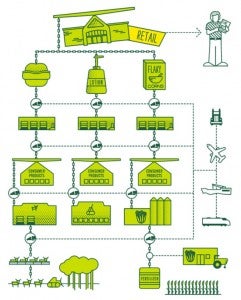A longer version of this post was first published on EDF+Business.
Sometimes when a problem seems too big, too ugly and too complex to handle, you need a lever to help move things along. All of the big environmental problems we currently face fall into this category.
When it comes to tackling our planet’s biggest problems, there is a full spectrum of approaches and many different leverage points. A thriving planet and a thriving economy, farmers included, don’t have to be at odds. EDF is focusing on helping businesses make their supply chains cleaner, more efficient and more profitable.
By collaborating with decision makers at every point in the agricultural supply chain – from retailers and food companies to agribusiness and farmers – we are building demand for and increasing the supply of sustainably produced grains.
Corporate demand for sustainability
Working with powerful business has been a cornerstone of EDF’s approach ever since we launched our first partnership with McDonald’s 25 years ago. Since then, we have kick-started market transformations in fast food with McDonalds and Starbucks, shipping with FedEx, retail with Walmart, and private equity with KKR. With each partnership, we’ve worked to create new, sustainable demand signals that extend across the supply chain. When powerful business speaks, suppliers listen. EDF is helping the most impactful companies commit to selling sustainably-produced products, encouraging every supplier and producer contributing to those products to also adopt more sustainable practices.
 EDF is currently focused on cleaning up consumer product supply chains in three key areas: deforestation, hazardous chemicals, and reducing the effects of fertilizer runoff from agriculture. By working with retailers and consumer products suppliers, EDF has the potential to effect real environmental gains on farms across the U.S., in forests in Brazil, in food products on store shelves, and in the air we breathe.
EDF is currently focused on cleaning up consumer product supply chains in three key areas: deforestation, hazardous chemicals, and reducing the effects of fertilizer runoff from agriculture. By working with retailers and consumer products suppliers, EDF has the potential to effect real environmental gains on farms across the U.S., in forests in Brazil, in food products on store shelves, and in the air we breathe.
Through our work with Walmart and The Sustainability Consortium, EDF has had the opportunity to look across incredibly large and complex supply chains, index the environmental “hot spots,” and work with key influencers on the chain.
Fertilizer efficiency
Nitrogen fertilizer use was one of those hot spots, giving EDF the opportunity to dig into greening the agricultural supply chain. Our work with Walmart to reduce 20 MMT of greenhouse gas emissions from its supply chain was a catalyst for focusing on optimizing fertilizer use. Now, by leveraging the power of businesses across the entire food supply chain, the momentum for sustainable grain is growing. To date, food companies and agribusiness have committed to fertilizer efficiency on 23 million acres across the U.S by 2020.
EDF and our corporate partners are making great gains, but there is so much more to be done. We need to keep building and strengthening the business lever by getting more companies to actively send smart demand signals across their supply chains. It’s good for the planet, and it’s good for business. Everyone wins.
Related Links
Strong market signal for sustainable grain
More reasons to embrace food sustainability
Campbell’s Soup expands its fertilizer optimization programs









